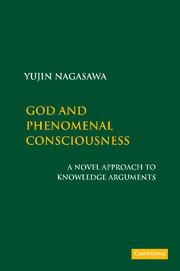Book contents
- Frontmatter
- Contents
- Preface
- PART I THE STRUCTURE OF KNOWLEDGE ARGUMENTS
- PART II KNOWLEDGE ARGUMENTS IN THE PHILOSOPHY OF RELIGION
- 2 Grim's Argument from Knowledge De Se
- 3 The Argument from Concept Possession (1)
- 4 The Argument from Concept Possession (2)
- PART III KNOWLEDGE ARGUMENTS IN THE PHILOSOPHY OF MIND
- PART IV KNOWLEDGE ARGUMENTS AND NONTHEORETICAL PHYSICALISM
- References
- Index
2 - Grim's Argument from Knowledge De Se
Published online by Cambridge University Press: 23 July 2009
- Frontmatter
- Contents
- Preface
- PART I THE STRUCTURE OF KNOWLEDGE ARGUMENTS
- PART II KNOWLEDGE ARGUMENTS IN THE PHILOSOPHY OF RELIGION
- 2 Grim's Argument from Knowledge De Se
- 3 The Argument from Concept Possession (1)
- 4 The Argument from Concept Possession (2)
- PART III KNOWLEDGE ARGUMENTS IN THE PHILOSOPHY OF MIND
- PART IV KNOWLEDGE ARGUMENTS AND NONTHEORETICAL PHYSICALISM
- References
- Index
Summary
INTRODUCTION
Knowledge arguments in the philosophy of religion purport to derive the ontological conclusion that God does not exist from relevant epistemological premisses about God's omniscience. In this chapter, I discuss Patrick Grim's argument from knowledge de se (Grim 1983, 1985, 2000, 2007) and its variations, which represent some of the most interesting arguments of this kind.
Grim challenges traditional theism by using John Perry's famous example of knowledge de se (Perry 1979). According to Grim, because no one else (no one other than me) can acquire knowledge de se of me, God's omniscience, that is, divine omniscience, is not omniscience simpliciter. From this, Grim concludes that an omniscient, omnipotent, and omnibenevolent God does not exist.
Ever since Aquinas, philosophers have been interested in the relationship between divine omnipotence and necessary impossibilities. However, in this chapter I am concerned with the relationship between divine omniscience and necessary impossibilities, which has attracted little attention. I argue that given two plausible principles regarding divine attributes, we need not accept Grim's conclusion that God does not exist. I then claim that my objection to Grim's argument is applicable to a similar argument discussed by William J. Mander (2002).
Imagine that, borrowing Perry's example, I find a trail of spilled sugar on the floor in a supermarket. I wonder which shopper is making this terrible mess all around the aisles and I decide to search for the one responsible.
- Type
- Chapter
- Information
- God and Phenomenal ConsciousnessA Novel Approach to Knowledge Arguments, pp. 17 - 35Publisher: Cambridge University PressPrint publication year: 2008

